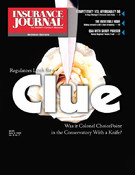Interviewed by Kevin B. O’Reilly
When Insurance Journal last spoke with Sandy Praeger, she was only months into the job. Kansans elected the Republican as insurance commissioner in November 2002. Back then she was tackling insurers’ use of credit scores in underwriting and rating, pushing a moderate bill that restricted, but did not ban the practice.
The bill eventually passed, but Praeger’s recent effort to battle insurance fraud–Senate Bill 207–has been tabled for the current legislative session, according to the Coalition Against Insurance Fraud. The bill would have stated that all insurance schemes are a crime and required carriers who suspected fraud to report it to the insurance department. The news about the bill’s fate came after the interview below was conducted. Praeger discussed how to better battle insurance fraud, the controversy over contingent commissions, and the progress Kansas is making to modernize its regulatory system and stave off Congressional oversight.
Insurance Journal: What are some of the issues holding up SB207’s passage?
Sandy Praeger: Folks in the industry are saying, ‘Maybe we’d better look at this again. We’re doing some wordsmithing now. All of a sudden they’re looking at mandatory reporting [of insurance fraud] and asking, ‘What do you mean by that? What happens if we don’t?’ We think that makes it easier for someone to justify telling because the decision is taken out of their hands. It remains to be seen whether we’ll hang on to that provision. If it hadn’t been for insiders, the Marsh issue would still be out there. It’s important for people in corporate world to know that if someone’s committing fraud, it’s everyone’s obligation to keep industry clean. Ninety-nine percent of folks want it that way; it’s just a few who create huge problems for everyone else. Then there’s an overreaction and bad laws are promulgated.
I’m hopeful we’ll be able to work through these issues. The main thing is for us to have more tools at our disposal to go after areas of insurance fraud. It’s not something a local district or county attorney place high on their priority list or go to court for very often. We’ve been doing that. A lot of that makes it easier for us. Attorney Gen Phill Kline has given [the Kansas Insurance Department] special attorney general’s status and we’ve done joint investigations. Another element of the bill is that companies need to demonstrate they have a policy that detects and prevent fraud from occurring and they have to submit that anti-fraud plan. We’re hopeful because we don’t think companies are going to want to look like they’re against good fraud reporting.
IJ: What can you tell us about fraud trends in Kansas? Are there any particular types of fraud that have been very prevalent?
Praeger: We had an issue about a year ago where we uncovered a scam on phony auto insurance. People had to be able to get proof of insurance for their driver’s license. This scam targeted immigrants and what they sold was not insurance, it was bogus. We’ve also had some issues with fraudulent health cards. We do have pretty good laws on the books regulating health discount programs.
IJ: Recently, Minnesota Attorney General Mike Hatch accused the Willis Group of dragging its feet in cooperating with his document requests and alleged that there’s evidence it steered business toward insurers it has contingency fee agreements with. What’s the status of any bid-rigging investigations in Kansas?
Praeger: There are also typical agent issues with agents not getting policies filed, but we have not uncovered any concerns with the kind of bid-rigging that went on with Marsh & MacLennan. We do have some of the big brokerage houses operating here, but we haven’t found evidence that criminal things have happened. The first thing I did when this Marsh and MacLennan story was released was to contact the attorney general and we established sort of an informal task force–we want their assistance on this matter and vice versa. So far we have not subpoenaed records. We’ve sent letters out requesting that they send us all their policies and procedures in terms of how they handle their clients.
IJ: The National Conference of Insurance Legislators’ model act on producer compensation disclosure is more narrowly targeted and favored by various industry groups. Do you think there’s room for compromise between the National Association of Insurance Commissioners and NCOIL on this?
Praeger: The debate becomes if big brokers are not doing it and others are, should we level the playing field and ban the practice altogether. You could make a good case for creating a level playing field. It’s going to shift the way money gets distributed between companies and brokers, and vice versa. But if we say they are no more contingent commissions, it’ll get built in into a fee in some way. I don’t know that the contingent commission in and of itself is bad. What is bad is bid-rigging and presenting phony bids, or steering bids toward one insurer because of the contingency fee agreement.
I’m comfortable having required disclosure. Customers need to know that if a broker is getting a fee from insurer, they will disclose it. The sophisticated buyer will be able to evaluate whether the commission is influencing the bid. But if it’s wrong in large contracts, it’s wrong in the small ones. It’s kind of a slippery slope there. There’s talk of banning contingent commissions where large blocks of business are being placed. Maybe that’s where the problem is. That leaves smaller agents and brokers alone. It’s the brokerage house that controls placement of a lot of insurance and that has the ability to demand contingent commissions and the small guy, the Main Street agent who is competing for business with a lot of others is going to take care of these problems in the marketplace. That’s certainly one of the argument that gets made.
We have to think through very carefully all of the potential disruptions. The money will somehow be distributed. It’s kind of like with campaign finance reform. We said you have to disclose and so we form PACs and created opportunities to hide whose contributing even more. So we need to proceed cautiously. I think we can’t let the emotion of the moment get us carried away. I really recommend the NAIC and [Pennsylvania Commissioner and NAIC president] Dianne Koken on this issue. I think we’ve taken a very measured and thoughtful approach.
IJ: How would you assess the progress that Kansas is making toward meeting the goals the National Association of Insurance Commissioners laid out in its modernization plan? What have you done so far and what’s left to do in order to meet the goal-date of 2008?
Praeger: We’re progressing. With each filing period we’re getting more of our filings done via SERF [the System for Electronic and Rate Form Filing]. Now we’re up to 30 percent, though some of our smaller companies say, “We can walk these things over. Why invest in the technology?” As for the market conduct aspects, we’re trying to achieve uniformity where that’s concerned. One of the goals was that if one state is doing an exam on a company to communicate that to others so other states could piggyback. We very much support that notion.
From a producer licensing standpoint, we’re working on one of the issues there. We’ve established joint task force with legislature to look at the appointment process and how fees are submitted. We’re trying to figure out how to do it in a way that doesn’t penalize our in-state folks. We need to create uniformity in the appointment process, because now there’s an agency appointment and then each of the agents within the agency is appointed. They all need to be appointed for every company. Some of the proposals we put forward had big costs shifts from one group to another. We want to do it without taking a big hit in revenue generated. You wouldn’t think it would be this difficult, but it has been. We’re trying to find a formula that treats everybody fairly.
IJ: In addition to SB 207, are there any other things that need to happen legislatively in order to better combat insurance fraud?
Praeger: What’s in SB 207 are good provisions to have, but we can still aggressively fight insurance fraud. We would like to get penalties increased. That’s important. If we don’t get everything we’ve asked for, I’m not going to let it hinder our efforts. We are advertising for another investigator. We already have an investigator in our anti-fraud division, and we need to focus on investigation. We’ve looked at what other states have done, and they have good investigators. … That’s where the focus needs to be.
Was this article valuable?
Here are more articles you may enjoy.


 Definity Financial to Buy Travelers Cos.’ Canadian Operations for $2.4 Billion
Definity Financial to Buy Travelers Cos.’ Canadian Operations for $2.4 Billion  US Court Blocks Most Trump Tariffs, Says President Exceeded His Authority
US Court Blocks Most Trump Tariffs, Says President Exceeded His Authority  Corporate Nuclear Verdicts Surged to New Record High in 2024, Report Says
Corporate Nuclear Verdicts Surged to New Record High in 2024, Report Says  Lawsuit Says Former Trident Exchange CEO Was ‘Self-Dealing’ on IT Work
Lawsuit Says Former Trident Exchange CEO Was ‘Self-Dealing’ on IT Work 


